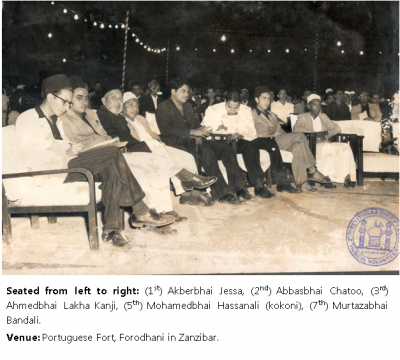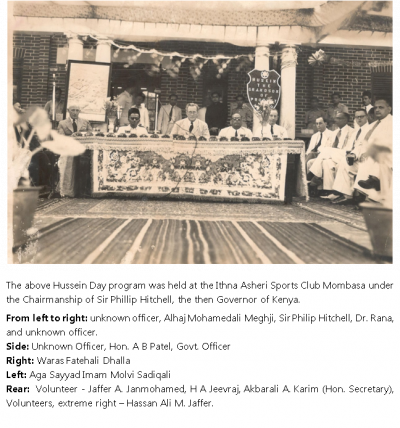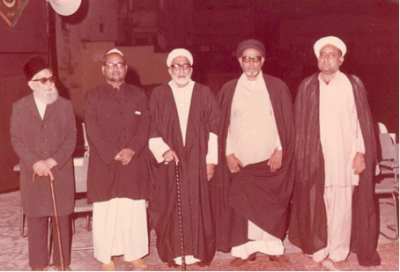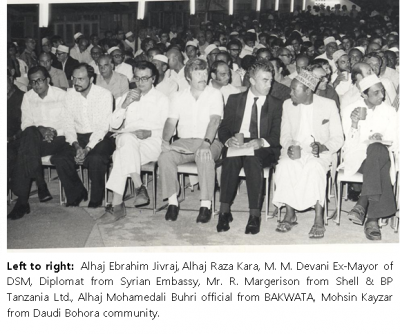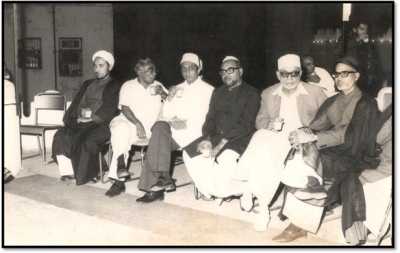Difference between revisions of "Hussein Day"
Mohamedali (talk | contribs) (→Hussein Day 1979 (Dar es Salaam)) |
Mohamedali (talk | contribs) (→Hussein Day 1979 (Dar es Salaam)) |
||
| Line 58: | Line 58: | ||
==Hussein Day 1979 (Dar es Salaam)== | ==Hussein Day 1979 (Dar es Salaam)== | ||
| − | ::::::::::::::::::'''Photograph taken after the program at the terrace of the Imambargha''' | + | :::::::::::::::::::'''Photograph taken after the program at the terrace of the Imambargha''' |
[[File:Hussein_day_1979.png|400px|thumb|center|Hussein Day 1979]] | [[File:Hussein_day_1979.png|400px|thumb|center|Hussein Day 1979]] | ||
Revision as of 13:29, 30 September 2020
Contents
Hussein Day during 1940s
The tradition of holding Hussein Day started in 1940’s in Zanzibar, Mombasa and Dar es Salaam. The aim was to propagate the message of Tragedy of Karbala and the mission of Imam Hussein (A.S.) to the general masses. The venues selected were always outside our Imambarghas where maximum participation of the general public is achieved.
In Zanzibar the first Hussein Day was held in Victoria Garden under an ad-hoc committee appointed by the Jamaat. The Hussein Day was attended by high government officials, diplomats, non-Muslims and Muslims of all denominations. The speakers were mostly outsiders who presented their views about the Kerbela tragedy. This was a unique way of propagating the message of Imam Hussein (A.S.) outside the community. In Zanzibar the chief guest was always the Sultan of Zanzibar. The popular venue was Portuguese Fort at Forodhani which exists till today.
In Mombasa the venue was Ithna Asheri Sports Club, organized by Ithna Asheri Young Mens` Union. In 1952, the Governor of Kenya, Sir Phillip Hitchell was the chief guest. Many dignitaries attended the program. Hussein Day used to be a very important annual event.
In Dar es Salaam, the first Hussein Day was held in 1945, on the open ground outside present mosque. Later in 1948, a building was built by Kanji Damani on this plot and the venue was shifted to Bohora School on Ring Street (Now Jamhuri School on Jamhuri Street). In 1960’s the Hussein Day was organized jointly by all the Muslim Communities jointly under the name of “All Muslim Hussein Day Society”. Alhaj Mohamedbhai Dhirani served as Hon. Secretary for many years under this Society.
Hussein Day during 1950s
Small towns like Kigoma, Mwanza, Bukoba, Lindi and other respective Jamaats were also organizing Hussein Day in 1950’s during the pre-independence period and continued for some time in post-independence period. In smaller Jamaats in Tanzania, due to migration of members to bigger cities like Dar Es Salaam, Arusha and Mwanza the tradition of Hussein Day has stopped in the smaller Jamaats. However, some Bilal Muslim Mission Centres in Tanzania, Kenya and Uganda are organizing Hussein Day in their districts and villages.
Hussein Day during 1970s
In 1970’s the Hussein Day after a lapse of many years was revived by the newly formed Ithna-Asheri Union Volunteers Corps (IUVC) with the support of Ithna-Asheri Union and the Khoja Shia Ithna- Asheri Jamaat of Dar Es Salaam. IUVC would form Hussein Day Ad-Hoc Committee which included IUVC heads, members of the community and youth. The prominent members were Murtaza bhai Lakha, Gulamhussein bhai S. Allarakhia (Golo Saleh), Akber bhai M G Dhalla, Aunali bhai Khalfan, Murtaza bhai Jivraj, Munis Bhai Bhalloo, Ibrahim bhai Nathoo, Muslim Bhai Jivraj, Mohamed bhai Kassam (Mukhi), Hassan bhai Nathani, Yusuf M G Dhalla, Murtaza Dewji, Mohamed Somji, Mohsin Nathani and several others.
The venue was our present Imambargha terrace before the vertical extension, this continued for several years. Hussein Day became more popular and continued to grow under the patronage of IUVC. Hussein Day was well attended by high ranking Government officials, Diplomats, Dignitaries, Leaders from various Communities, Religious Leaders, Sheikhs from different Mosques and Religious Institutes and students from Madressahs and the general public.
Hussein Day during 1990s
In the later years in 1990’s the Hussein Day stopped being held and to-date the tradition of Hussein Day has sadly disappeared. We are hopeful that this tradition of Hussein Day will be revived again as it provides important platform to carry out Tabligh and to relay the message of Imam Hussein (A.S.) and the martyrs of tragedy of Karbala to the masses.
- HUSSEIN DAY IN ZANZIBAR - 13TH SEPTEMBER 1957
- MOMBASA HUSSEIN DAY - 1952
- UNDER THE ITHNA ASHERI YOUNG MEN’S UNION OF MOMBASA JAMAAT
- HUSSEIN DAY PHOTOGRAPH DAR-ES-SALAAM - 1980
Left to Right: Murrabi Ahmedbhai Lakha (Zakir), Maulana Sheikh Jalali, Maulana Sheikh Mohammed Kassim, Maulana Sayed Saeed Akhtar Rizvi, Maulana Sheikh Zaffar Abbas
Below: the well attended Hussein Day with guests from different communities, dignitaries including our brothers in Dar Es Salaam.
Source: Article and photographs by curtsey of Murtaza bhai Jivraj (Kerbala)
SECRETARIAT
AFRICA FEDERATION ARCHIVES SECTION
13th April 2018 (26th Rajab 1439 AH)
Hussein Day 1979 (Dar es Salaam)
- Photograph taken after the program at the terrace of the Imambargha
From Left to Right: Sheikh Ishaq Najafi, Chairman of Hindu Mandal Community, Mohsin bhai Kayzar of Bohora Community, Maulana Safdar Jalali, Molvi Ali-Mohammad Dewji, Sayeed Karar Hussein, Zakir from India who came to recite majlises in Dar es Salaam during Ashra-e-Zainabiya.
Secretariat
Africa Federation Archives Section
12th November 2016 (11th Safar 1438 AH)
